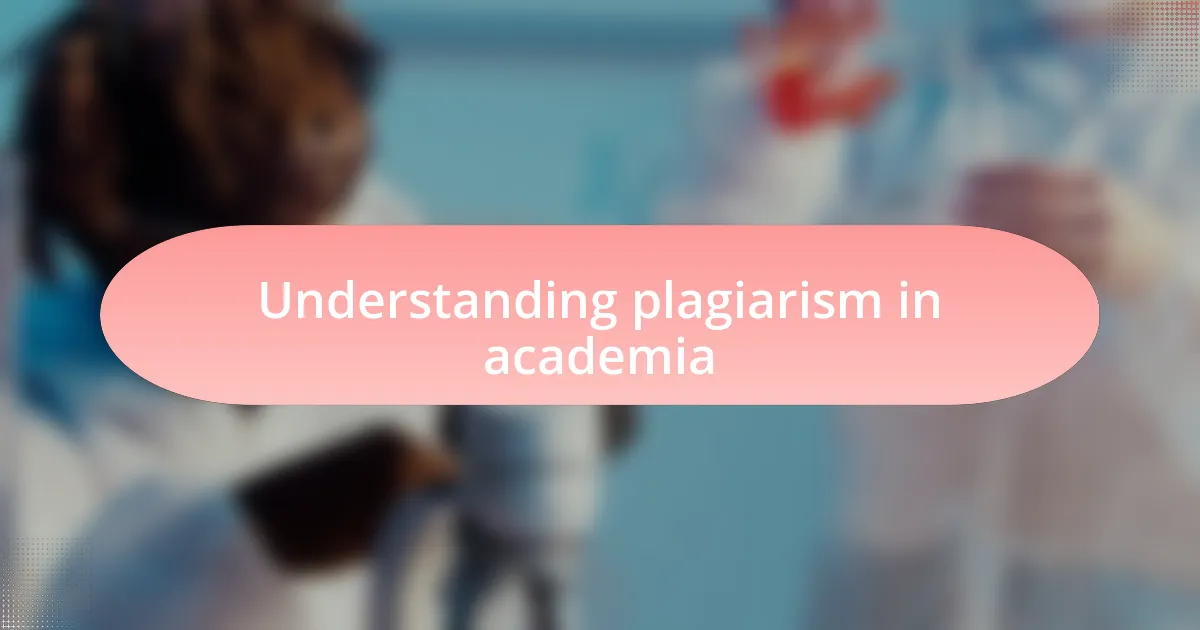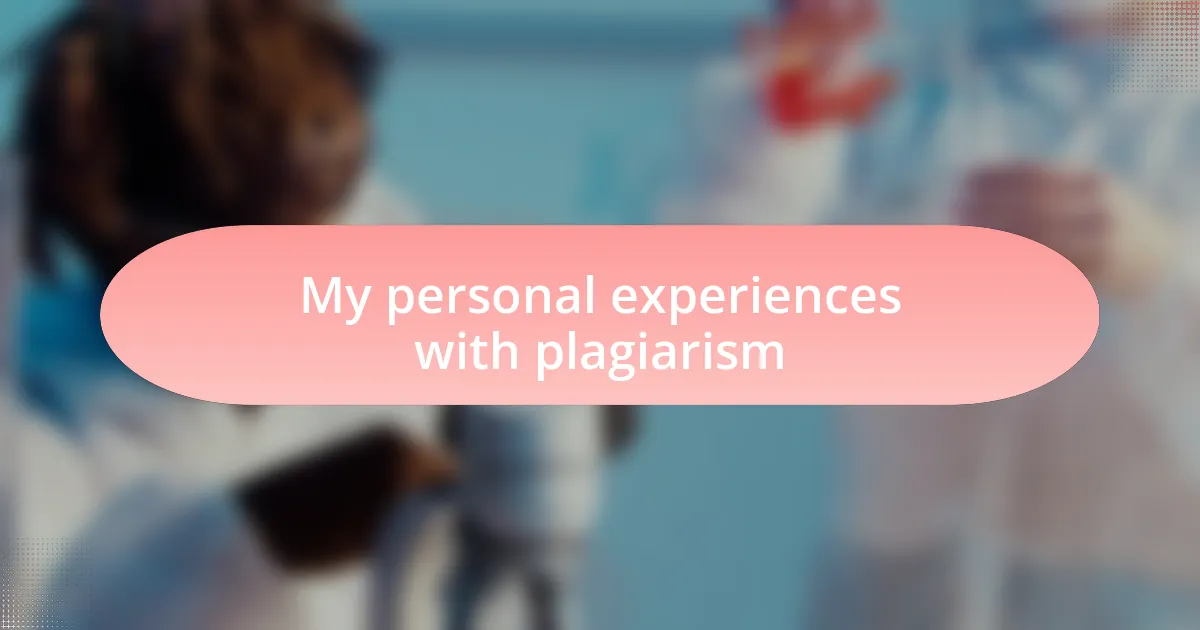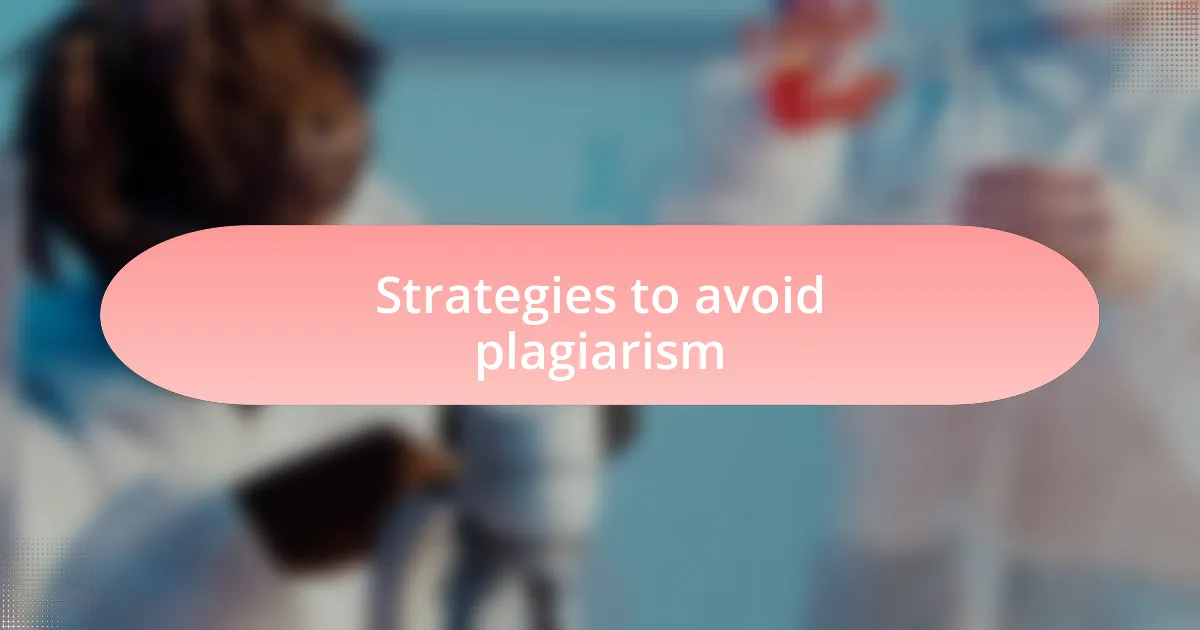Key takeaways:
- Plagiarism in academia involves more than copying; it affects scholarly integrity and requires proper citation to maintain honesty.
- Students may resort to plagiarism due to pressures such as deadlines and workloads; understanding material deeply helps foster originality.
- Taking diligent notes, using one’s own voice, and utilizing plagiarism detection tools are effective strategies to avoid plagiarism.
- Engaging in open dialogues about plagiarism can reinforce trust and academic values within scholarly communities.

Understanding plagiarism in academia
Plagiarism in academia isn’t merely about copying words; it’s a complex issue that impacts the integrity of scholarly work. I remember a time during my early research days when I accidentally paraphrased a study without proper citation. The sinking feeling I had upon realizing it taught me just how crucial proper attribution is in maintaining academic honesty.
I often wonder, why do some students resort to plagiarism? There could be numerous pressures—tight deadlines, heavy workloads, or even a fear of not meeting expectations. From my experience, it’s essential to cultivate a genuine understanding of the material, as that not only enriches your work but also builds confidence to present original thoughts.
Another aspect worth considering is the digital age we live in, where information is abundant and easily accessible. This ease can sometimes blur the lines of originality. In my opinion, navigating this landscape requires a strong ethical compass and a commitment to intellectual honesty, ensuring that our contributions to academia reflect our true insights and efforts.

My personal experiences with plagiarism
During my graduate studies, I encountered a particularly challenging assignment that left me feeling overwhelmed. I remember sitting at my desk, staring at the blank page, and for a fleeting moment, I considered the tempting shortcut of taking someone else’s work. It was a wake-up call; the thought of submitting something unoriginal left me feeling anxious. Instead, I pushed through, which ultimately resulted in a deeper understanding of my topic and a paper I felt proud of.
On another occasion, while reviewing a peer’s work, I found sections that felt alarmingly similar to existing literature. This realization sparked a mix of concern and frustration within me. I questioned, how can we build knowledge if we’re not creating unique contributions? It emphasized in me the importance of fostering an environment where originality is celebrated rather than feared, as it’s through our unique perspectives that true innovation happens.
Reflecting on these experiences, I realize how critical transparency is in academic writing. I once faced a situation where a colleague’s work drew scrutiny for suspected plagiarism. The tension surrounding the issue was palpable, and it made me think about the broader consequences of such actions. How do we repair trust in academic spaces when integrity is compromised? Engaging in open dialogues about plagiarism can strengthen our collective resolve to uphold academic values.

Strategies to avoid plagiarism
To avoid plagiarism, one of the best strategies is to take diligent notes while researching. I remember during one of my projects, I developed a system where I categorized information by topic and source. This method made it much easier to reference correctly later; I felt more confident knowing exactly where each piece of information came from. Have you ever struggled to track the origin of your thoughts? A simple note-taking system can save you a lot of stress.
Another key approach involves using your own voice and perspective. Early in my academic career, I found myself directly copying phrases that sounded sophisticated, thinking it would enhance my work. But I soon realized that original insights are far more valuable than fancy wording. How can we truly advance knowledge if we’re merely echoing others? Embracing your unique viewpoint not only enriches your writing but also minimizes the temptation to rely on others’ expressions.
Lastly, utilizing plagiarism detection tools can offer peace of mind that your work is authentic. When I first started submitting articles, I used a tool to check my drafts for unintentional similarities with existing literature. It was eye-opening; I discovered areas where I needed to rephrase or add more of my own analysis. Have you ever considered how helpful technology can be in maintaining integrity? Regularly running your work through these tools can be an invaluable step in the writing process and foster a habit of originality.